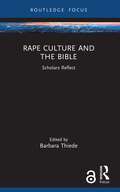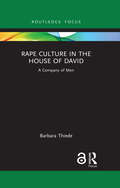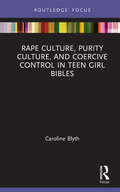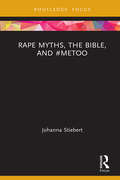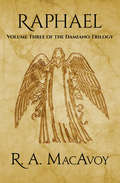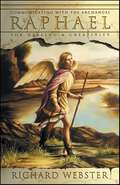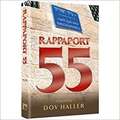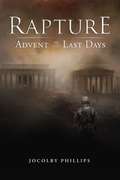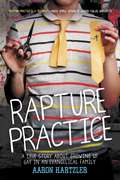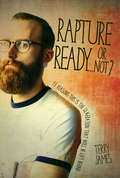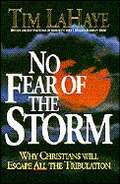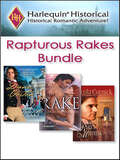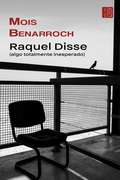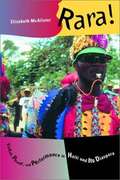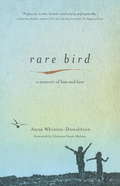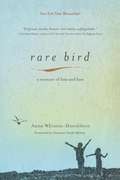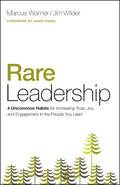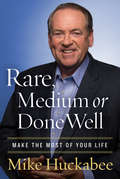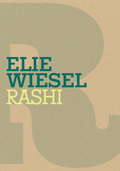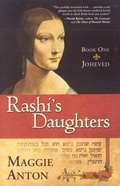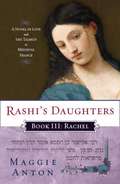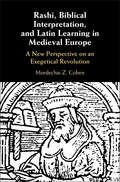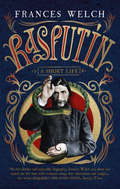- Table View
- List View
Rape Culture and the Bible: Scholars Reflect (Rape Culture, Religion and the Bible)
by Barbara ThiedeRape Culture and the Bible: Scholars Reflect offers readers the opportunity to hear from prominent and influential biblical scholars and scholar activists as they reflect on their work on sexual violence vis-a-vis the Bible. This book covers major points of inquiry in the field, focusing primarily on the Hebrew Bible and the New Testament. It explores debates on appropriate terminology; intersectionality of sexual violence, gender, and race; how survivor perspectives inform the reading of violent texts; male-on-male sexualized violence in biblical literature; and the connections of Judeophobia with sexual violence in early Christian literature. The introductory chapter establishes methodology, purpose, and aims of this volume. The final chapter reflects on the ethical concerns governing the field, challenges scholars have faced in their discipline, and the tasks ahead. Along the way, Rape Culture and the Bible demonstrates how rape and rape culture in the Bible impact real lives across time and the globe.The Open Access version of this book, available at http://www.taylorfrancis.com, has been made available under a Creative Commons Attribution-Non Commercial-No Derivatives (CC BY-NC-ND) 4.0 license.
Rape Culture in the House of David: A Company of Men (Rape Culture, Religion and the Bible)
by Barbara ThiedeRape Culture in the House of David: A Company of Men describes a biblical rape culture sustained and maintained by Yhwh and a host of men—from royal kings and princes to their relatives, counselors, generals, and servants. This volume reveals that sexual violence in the house of David is not simply perpetrated by its most powerful men. Rather, in the pursuit of power, status, authority, and honor, men form alliances and networks that support the use and abuse of women’s bodies and valorize sexualized violence against other men. The man who is most capable of sexual violence is Israel’s ideal king. Barbara Thiede deftly addresses the power and contemporary relevance of these narratives and argues that exposing and naming rape culture in biblical literature is essential—in social, economic, and political realms. This is a meaningful feminist intervention in the field of biblical studies and is of great benefit to graduate students and scholars of religion, gender studies, and masculinity studies.
Rape Culture in the House of David: A Company of Men (Rape Culture, Religion and the Bible)
by Barbara ThiedeRape Culture in the House of David: A Company of Men describes a biblical rape culture sustained and maintained by Yhwh and a host of men—from royal kings and princes to their relatives, counselors, generals, and servants.This volume reveals that sexual violence in the house of David is not simply perpetrated by its most powerful men. Rather, in the pursuit of power, status, authority, and honor, men form alliances and networks that support the use and abuse of women’s bodies and valorize sexualized violence against other men. The man who is most capable of sexual violence is Israel’s ideal king.Barbara Thiede deftly addresses the power and contemporary relevance of these narratives and argues that exposing and naming rape culture in biblical literature is essential—in social, economic, and political realms.This is a meaningful feminist intervention in the field of biblical studies and is of great benefit to graduate students and scholars of religion, gender studies, and masculinity studies.The Open Access version of this book, available at http://www.taylorfrancis.com, has been made available under a Creative Commons Attribution-Non Commercial-No Derivatives (CC BY-NC-ND) 4.0 license
Rape Culture, Purity Culture, and Coercive Control in Teen Girl Bibles (Rape Culture, Religion and the Bible)
by Caroline BlythIn this fascinating book, Caroline Blyth takes a close look at Bibles marketed to teen girls and asks how these might perpetuate harmful gender stereotypes that lie at the heart of rape culture. The author considers the devotionals, commentaries, and advice sections placed throughout these Bibles, which offer teen girl readers life advice on topics such as friendships, body image, and how to navigate romantic relationships. Within these discussions, there is a strong emphasis on modesty, purity, and sexual passivity as markers of young women’s ‘godliness’. Yet, as the author argues, these gendered ideals are prescribed to readers using rape-supportive discourses and the tactics of coercive control. Moreover, the placement of these various editorial inserts within the pages of sacred scripture gives them considerable power to reinforce deeply harmful ideologies about gender, sexuality, and sexual violence. Given the seeming popularity of these Bibles among Christian teen girls, the need to dismantle their damaging rhetoric is especially urgent. This book will be of particular interest to those studying the Bible, religion, gender, and theology, as well as the general reader.
Rape Myths, the Bible, and #MeToo (Rape Culture, Religion and the Bible)
by Johanna StiebertBiblical studies is increasingly interdisciplinary and frequently focuses on how the Bible is read, received, and represented in the contemporary world, including in politics, news media, and popular culture. Rape Myths, the Bible and #MeToo illustrates this with particular and critical assessment of #MeToo and its rapid and global impact. Rape myths – in particular the myth that rape victims are complicit in the violence they encounter, which consequently renders sexual violence ‘not so bad’ – are examined both with regard to current backlash to #MeToo and to biblical texts that undermine the violence perpetrated by rape. This includes aggressive media attacks on the accusers of powerful men, as well as depictions of biblical rape victims such as Dinah (Genesis 34), Bathsheba, and Tamar (2 Samuel 11–13). Biblical studies channels and expresses wider cultural and political manifestations. This exemplifies that the influence of ancient texts is abiding and the study of the past cutting edge.
Raphael (The Damiano Trilogy #3)
by R. A. MacAvoyThe third novel in the Philip K. Dick Award–winning author&’s fantasy trilogy set in Renaissance Italy, featuring archangels, dragons, and Lucifer. Set against the turbulent backdrop of the Italian Renaissance, this alternate history takes place in a world where real faith-based magic exists. Weakened by his contact with mortals, the Archangel Raphael falls prey to his brother Lucifer, who strips him of his angelic powers. Sold in the Moorish slave markets, confused and humbled by his sudden humanity, Raphael finds his only solace in the friendship of the dark-skinned Berber woman Djoura and the spiritual guardianship of his former pupil Damiano Delstrego. Accompanied by the rakish Gaspare and an ancient black dragon, Damiano&’s beloved Saara embarks on a quest to rescue Raphael. Their odyssey leads them to a shattering confrontation with the Father of Lies and a transcendent reckoning with destiny. Blending humor, pathos, adventure, and romance, the two previous volumes in R. A. MacAvoy&’s trilogy have evoked admiration and praise from writers and readers. Raphael fulfills the promise of the trilogy to forge a magnificent, moving saga you will never forget. The haunting conclusion of a magnificent fantasy trilogy, which began with Damiano and continued with Damiano&’s Lute.
Raphael: Communicating with the Archangel for Healing & Creativity
by Richard WebsterA social worker finds sudden relief from a mysterious illness. A confused student discovers her true passion. A guilt-ridden widow reconnects with her daughter. These and other true stories, recounted by Richard Webster in Raphael, demonstrate the positive, healing impact this wise and benevolent archangel has had on countless lives.Whether your pain is physical or emotional, the archangel Raphael—also known as the Divine Physician—can help. This book offers meditations, rituals, visualizations, amulets, and other practical techniques for contacting the "guardian angel of all humanity." Raphael can assist with health problems, finding lost or stolen items, recovering from emotional trauma, travel, spiritual guidance, and learning.
Rappaport 55: A Novel
by Dov HallerStep into Rappaport 55. The tiny apartments off the narrow alley ways of Meah Shearim are called dirarahs. The heating rarely works, and the water pressure is weak, but the power and potency of life in the dirah is unmatched. Here the young men who've come to learn in Israeli yeshivas sleep and cook and experience a life very different from the one they've known back home, in American or Canada or England or Australia. Rappaport 55 is just one more dirah on streets filled with them - but the people inside will intrigue you. Because you know them. And because real life is happening here, you find yourself totally involved in the challenges and struggles and the big and little successes of this group of young men on the cusp of adulthood.
Rapture Advent of the Last Days
by Jocolby PhillipsChristopher, the leader of an elite U.S. special operations unit undertakes one of the most important missions of his military career, attempting to rescue a French journalist kidnapped by ISIS, while distracted with trusting God over himself. He is confused and angry with God and ineffective in his leadership, however, Jackson, the team-deputy and long-time mentor and friend provides much-needed stability for Christopher and the team.The operation reinforces in Christopher that God was not to be trusted when needed most and Jackson leaves the mission searching for God and meaning to his life, as the men prepare to return to Washington D.C for debriefing. As Christopher and his team redeploy from the rescue mission back to Washington D.C., they find themselves out of work as the National Security Advisor deactivates the Christopher-led unit pending an investigation into the failed journalist rescue.Things go from bad to worse for Christopher and Jackson as the two disgraced soldiers are thrust, unbeknownst to them, into the midst of the Rapture. They attempt to keep the chaos of a post-rapture world at bay, in a series of globetrotting missions, from rural Virginia to Brazil, ancient Babylon to remote Alaska. The actions of the president and others leave the world on the brink of World War. Christopher continues throughout each mission to trust himself above God. He refuses to listen to the Holy Spirit-inspired advice that those around him provide and the question lingers will he reconcile and surrender his pain to God.
Rapture Practice: A True Story About Growing Up Gay in an Evangelical Family
by Aaron HartzlerSometimes salvation is found in the strangest places: a true story. Aaron Hartzler grew up in a home where he was taught that at any moment the Rapture could happen. That Jesus might come down in the twinkling of an eye and scoop Aaron and his family up to heaven. As a kid, Aaron was thrilled by the idea that every moment of every day might be his last one on planet Earth.But as Aaron turns sixteen, he finds himself more attached to his earthly life and curious about all the things his family forsakes for the Lord. He begins to realize he doesn't want the Rapture to happen just yet--not before he sees his first movie, stars in the school play, or has his first kiss. Eventually Aaron makes the plunge from conflicted do-gooder to full-fledged teen rebel.Whether he's sneaking out, making out, or playing hymns with a hangover, Aaron learns a few lessons that can't be found in the Bible. He discovers that the best friends aren't always the ones your mom and dad approve of, and the tricky part about believing is that no one can do it for you.In this funny and heartfelt coming-of-age memoir, debut author Aaron Hartzler recalls his teenage journey to find the person he is without losing the family that loves him. It's a story about losing your faith and finding your place and your own truth--which is always stranger than fiction.
Rapture Ready…Or Not?: 15 Reasons this is the Generation that will be left behind
by Terry JamesRead the detailed, precise frame of reference of where this generation stands on God's prophetic timeline Discover how each chapter points specifically to what the strange, troubling things happening in a world seemingly gone insane with unstoppable violence means for the immediate future and beyond Reflect on the very Word of God --the Bible-- in pointing to the only hope the reader and those he or she loves has for escaping God's righteous judgment that is about to fall on a rebellious world. Rapture Ready...or Not is for this generation of readers who are confused and look upon a world that seems to have destroyed opportunity for a bright, abundant future. The Rapture is about to catastrophically strike an unsuspecting world of both unbelievers and believers. Jesus Christ is the Shelter from the coming Tribulation storm of God's wrath and judgment.
Rapture Under Attack: Will Christians Escape the Tribulation?
by Tim LahayeA defense and explanation of endtimes prophecy.
Rapturous Rakes Bundle
by Nicola Cornick Diane Gaston Alison J. HentgesCan't get enough of those dashing Regency rakes? Don't miss these three romantic adventures set in Regency London!
Raquel Disse (algo totalmente inesperado).
by Mois Benarroch Lucas Damasceno de AguiarRaquel Disse (algo totalmente inesperado). Há alguém atrás de nós que nos diz que em algum lugar há outra pessoa no mundo que vive uma vida paralela à nossa, que sente o mesmo, que pode até estar fazendo o mesmo neste momento. Mas o que acontece quando duas linhas paralelas se encontram? O impossível acontece e o que não deveria acontecer. Se a alma gêmea existe e se sentimos vontade de conhecê-la, isso não significa que a reunião facilite a vida ou nos dê soluções.
Rara! Vodou, Power, and Performance in Haiti and Its Diaspora
by Elizabeth A. McalisterThis book is the first full-length study of the religious music festival known as Rara as it is traditionally practiced in Haiti and Brooklyn. A centuries-old religious tradition with roots in plantation slavery, this community-produced music grows out of Afro-Haitian voodoo and is frequently used to launch political criticism.
Rare Bird
by Glennon Melton Anna Whiston-DonaldsonI wish I had nothing to say on the matter of loss, but I do. Because one day I encouraged my two kids to go out and play in the rain, and only one came home....________________________________________________________________________ Are you brave enough to step into the light? On an ordinary September day, twelve-year-old Jack is swept away in a freak neighborhood flood. His parents and younger sister are left to wrestle with the awful questions: How could God let this happen? And, Can we ever be happy again? They each fall into the abyss of grief in different ways. And in the days and months to come, they each find their faltering way toward peace. In Rare Bird, Anna Whiston-Donaldson unfolds a mother's story of loss that leads, in time, to enduring hope. "Anna's storytelling," says Glennon Doyle Melton, "is raw and real and intense and funny." With this unforgettable account of a family's love and longing, Anna will draw you deeper into a divine goodness that keeps us--beyond all earthly circumstances--safe.This is a book about facing impossible circumstances and wanting to turn back the clock. It is about the flicker of hope in realizing that in times of heartbreak, God is closer than your own skin. It is about discovering that you're braver than you think.Praise for Rare Bird"In her beautiful, clear-eyed prose Anna brings to life complex miracles: that the anchor of being strong is tied to feelings of unbearable weakness; that the ache of grief is often accompanied by glittering beauty; and that all we do not understand is more important to making sense of life than what we know. Her story, as well as Jack's story, is gorgeous, bold and true, and no one will be unchanged in reading it."-- Stacy Morrison, Editor in Chief, BlogHer; author of Falling Apart in One Piece"This is not a book; it is a kaleidoscope. With every turn of the page, a new discovery is made that forever alters your view of pain, joy, heartache, time, hope, and healing. As I journeyed through Anna's divinely written prose, I found myself unable to stand by as a passive recipient of her message. I needed to act. Because of Anna and Jack, I talked with my child about heaven. I walked around the pool's edge to sit beside a grieving woman. I looked into the darkest places of my soul and for the first time, I did not look away. If you yearn to stop hiding from that which prevents you from truly living, step into the kaleidoscope that is Rare Bird. Turn the page--wake up, stand up, comfort, love, and live. Turn the page--let your eyes be opened to the light that exists in whatever darkness you face."-- Rachel Macy Stafford, New York Times best-selling author of Hands Free Mama"A masterpiece of hope, love, and the resilience and ferocity of the human spirit."-- From the foreword by Glennon Doyle Melton, Momastery.com; author of Carry On, Warrior "Rare Bird is not just another well-written story of love, loss, and the aftermath of death, but it is a story that clearly shows the constant presence and grace of a loving God. It gives assurance and comfort to those whose hearts are grieving, and hope to those who are afraid."-- Mary C. Neal, MD, New York Times best-selling author of To Heaven and BackFrom the Hardcover edition.
Rare Bird: A Memoir of Loss and Love
by Glennon Melton Anna Whiston-DonaldsonI wish I had nothing to say on the matter of loss, but I do. Because one day I encouraged my two kids to go out and play in the rain, and only one came home. . . . Now a New York Times bestseller! On the other side of heartbreak, a story of hope rises. On an ordinary September day, twelve-year-old Jack is swept away in a freak neighborhood flood. His parents and younger sister are left to wrestle with the awful questions: How could God let this happen? And, Can we ever be happy again? They each fall into the abyss of grief in different ways. And in the days and months to come, they each find their faltering way toward peace. In Rare Bird, Anna Whiston-Donaldson unfolds a mother's story of loss that leads, in time, to enduring hope. "Anna's storytelling," says Glennon Doyle Melton, "is raw and real and intense and funny. " With this unforgettable account of a family's love and longing, Anna will draw you deeper into a divine goodness that keeps us--beyond all earthly circumstances--safe. This is a book about facing impossible circumstances and wanting to turn back the clock. It is about the flicker of hope in realizing that in times of heartbreak, God is closer than your own skin. It is about discovering that you're braver than you think.
Rare Leadership: 4 Uncommon Habits For Increasing Trust, Joy, and Engagement in the People You Lead
by Marcus Warner Jim WilderRevive your leadership. Grow healthy teams. See great results. Healthy teams begin with healthy leaders, and at the heart of this dynamic is emotional maturity—the quality the greatest leaders possess. Combining solid theology, cutting-edge brain science, and decades of counseling and consulting experience, Rare Leadership shows you how to take your leadership and team to the next level. It will equip you to:Cultivate emotional maturity in yourself and othersDevelop the four habits of R.A.R.E. leadersPromote a strong group identity Keep relationships bigger than problemsIncrease productivity through trust, joy, and engagementWhether you are burnt out or just looking to improve, when you prioritize people and lead from a secure identity, you&’ll be amazed at the freedom you feel and the results you see. You can lead from a healthy place, respond rather than react, and build the team of your dreams.If you want to take your organization to the next level, it starts with you. Read Rare Leadership and be equipped to lead joy-filled, emotionally mature, relationally connected teams.
Rare Leadership: 4 Uncommon Habits For Increasing Trust, Joy, and Engagement in the People You Lead
by Marcus Warner Jim WilderRevive your leadership. Grow healthy teams. See great results. Healthy teams begin with healthy leaders, and at the heart of this dynamic is emotional maturity—the quality the greatest leaders possess. Combining solid theology, cutting-edge brain science, and decades of counseling and consulting experience, Rare Leadership shows you how to take your leadership and team to the next level. It will equip you to:Cultivate emotional maturity in yourself and othersDevelop the four habits of R.A.R.E. leadersPromote a strong group identity Keep relationships bigger than problemsIncrease productivity through trust, joy, and engagementWhether you are burnt out or just looking to improve, when you prioritize people and lead from a secure identity, you&’ll be amazed at the freedom you feel and the results you see. You can lead from a healthy place, respond rather than react, and build the team of your dreams.If you want to take your organization to the next level, it starts with you. Read Rare Leadership and be equipped to lead joy-filled, emotionally mature, relationally connected teams.
Rare, Medium, or Done Well: Make the Most of Your Life
by Mike HuckabeeARE YOU WONDERING HOW TO MAKE A DIFFERENCE IN TODAY’S CULTURE THAT WILL BENEFIT FUTURE GENERATIONS? Former Governor Mike Huckabee shares how to live a life that will continue to be felt by those who carry your legacy forward. Whether in politics, family, education, or business, what matters most is leaving a legacy for future generations. Rare, Medium or Done Well emphasizes the importance of understanding where we’ve been, where we are now, and how both determine where we’re going. Mike asserts, “A person who has no standard to live by other than the culture of the moment is a person whose principles might as well come from the latest public opinion polls.”
Rashi
by Elie Wiesel Catherine TemersonFrom Elie Wiesel, winner of the Nobel Peace Prize, comes a magical book that introduces us to the towering figure of Rashi--Rabbi Shlomo Yitzchaki--the great biblical and Talmudic commentator of the Middle Ages. Wiesel brilliantly evokes the world of medieval European Jewry, a world of profound scholars and closed communities ravaged by outbursts of anti-Semitism and decimated by the Crusades. The incomparable scholar Rashi, whose phrase-by-phrase explication of the oral law has been included in every printing of the Talmud since the fifteenth century, was also a spiritual and religious leader: His perspective, encompassing both the mundane and the profound, is timeless.Wiesel's Rashi is a heartbroken witness to the suffering of his people, and through his responses to major religious questions of the day we see still another side of this greatest of all interpreters of the sacred writings. Both beginners and advanced students of the Bible rely on Rashi's groundbreaking commentary for simple text explanations and Midrashic interpretations. Wiesel, a descendant of Rashi, proves an incomparable guide who enables us to appreciate both the lucidity of Rashi's writings and the milieu in which they were formed.From the Hardcover edition.
Rashi's Daughter's, Book I: A Novel of Love and the Talmud in Medieval France
by Maggie AntonRashi, one of the greatest Jewish scholars who ever lived, had no sons, only three daughters. Much has been written about Rashi and his grandsons, the Tosafot, but almost nothing of his daughters. Legend has it that they were learned in a time when women were forbidden to study the sacred texts. Rashi's Daughters tells the story of these forgotten women.
Rashi's Daughters, Book III: A Novel of Love and Talmud In Medieval France
by Maggie AntonThe dramatic final book in the epic historical trilogy about the lives and loves of the three daughters of the great Talmud scholar Rashi. Rachel is the youngest and most beautiful daughter of medieval Jewish scholar Salomon ben Isaac, or "Rashi." Her father's favorite and adored by her new husband, Eliezer, Rachel's life looks to be one of peaceful scholarship, laughter, and love. But events beyond her control will soon threaten everything she holds dear. Marauders of the First Crusade massacre nearly the entire Jewish population of Germany, and her beloved father suffers a stroke. Eliezer wants their family to move to the safety of Spain, but Rachel is determined to stay in France and help her family save the Troyes yeshiva, the only remnant of the great centers of Jewish learning in Europe. As she did so effectively in Joheved and Miriam, Maggie Anton vividly brings to life the world of eleventh-century France and a remarkable Jewish woman of dignity, passion, and strength.
Rashi, Biblical Interpretation, and Latin Learning in Medieval Europe: A New Perspective on an Exegetical Revolution
by Mordechai Z. CohenIn this volume, Mordechai Z. Cohen explores the interpretive methods of Rashi of Troyes (1040–1105), the most influential Jewish Bible commentator of all time. By elucidating the 'plain sense' (peshat) of Scripture, together with critically selected midrashic interpretations, Rashi created an approach that was revolutionary in the talmudically-oriented Ashkenazic milieu. Cohen contextualizes Rashi's commentaries by examining influences from other centers of Jewish learning in Muslim Spain and Byzantine lands. He also opens new scholarly paths by comparing Rashi's methods with trends in Latin learning reflected in the Psalms commentary of his older contemporary, Saint Bruno the Carthusian (1030–1101). Drawing upon the Latin tradition of enarratio poetarum ('interpreting the poets'), Bruno applied a grammatical interpretive method and incorporated patristic commentary selectively, a parallel that Cohen uses to illuminate Rashi's exegetical values. Cohen thereby brings to light the novel literary conceptions manifested by Rashi and his key students, Josef Qara and Rashbam.
Rasputin: A short life
by Frances WelchGrigory Rasputin, the Siberian peasant-turned-mystic, was as fascinating as he was unfathomable. He played the role of the simple man, eating with his fingers and boasting, 'I don't even know my ABC...' But, as the only person able to relieve the symptoms of haemophilia in the Tsar's heir Alexis, he gained almost hallowed status within the Imperial court. During the last decade of his life, he and his band of 'little ladies' came to symbolise all that was decadent and remote about the royal family.His role in the downfall of the tsarist regime is beyond dispute. But who was he really? Prophet or rascal?In this eye-opening short biography, which draws on previously unpublished material, Frances Welch turns her inimitable wry gaze on one of the great mysteries of Russian history.
